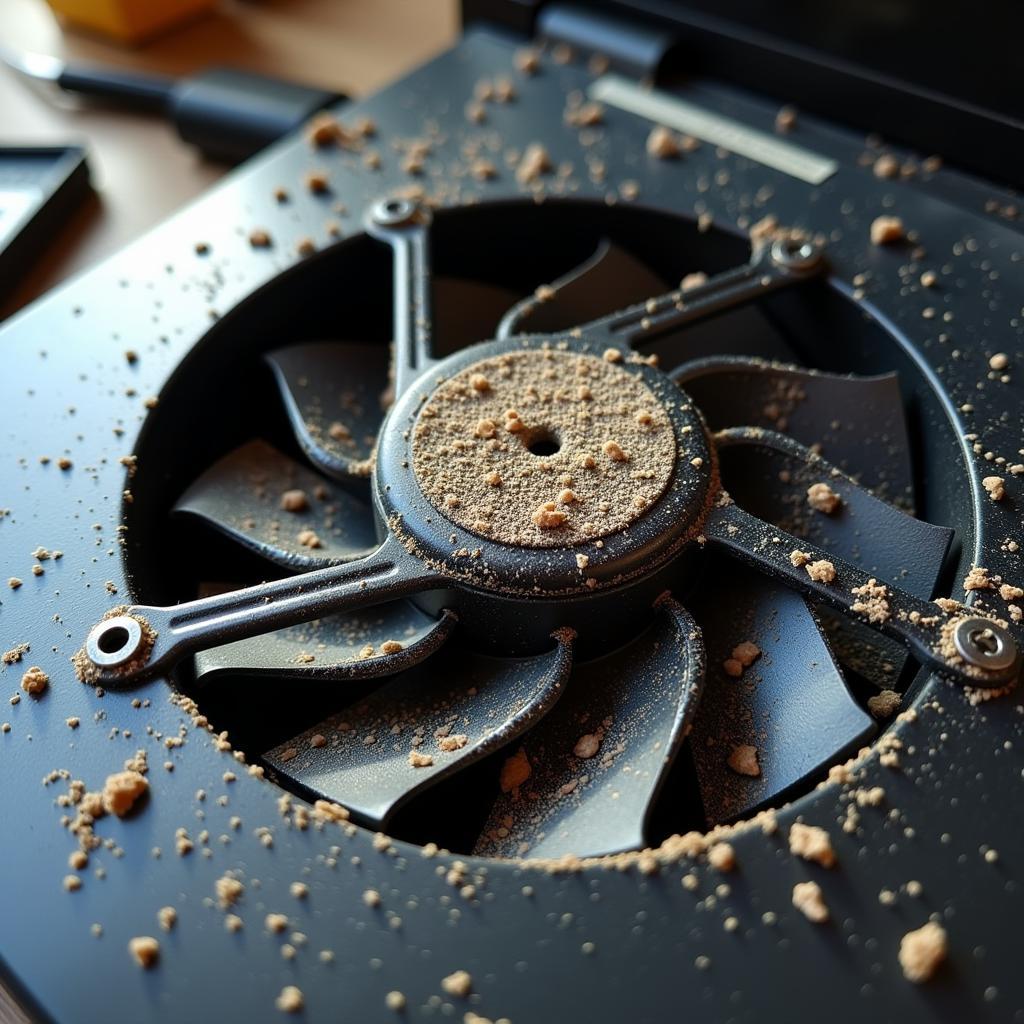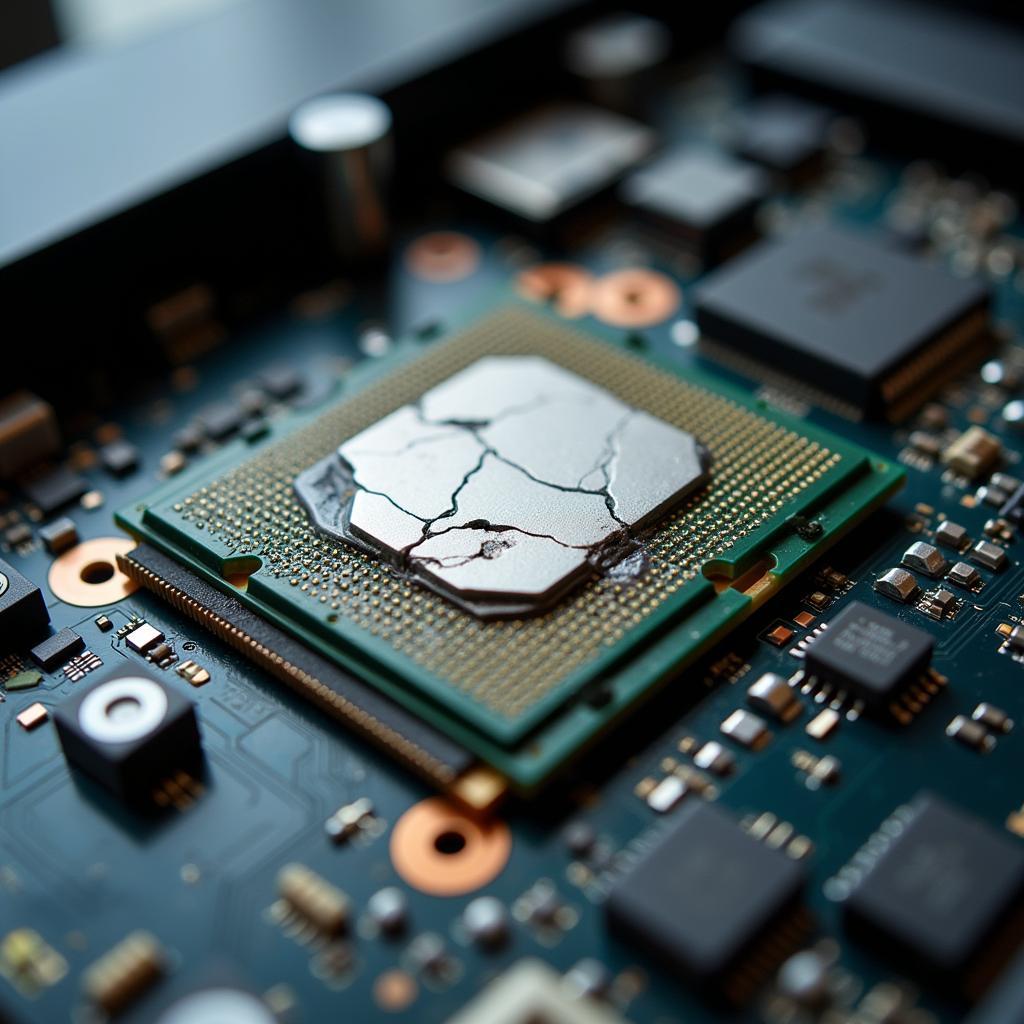Your laptop fan is whirring, but your laptop is still hot. This can be a frustrating and potentially damaging problem. In this article, we’ll explore the reasons why your laptop might be overheating even with a functioning fan, and provide practical solutions to help you cool things down.
Why is My Laptop Hot Even Though the Fan is Running?
Several factors can contribute to a hot laptop despite a seemingly operational fan. These range from simple software issues to more complex hardware problems. Let’s delve into the most common culprits.
Dust and Debris Buildup
 Dust buildup clogging a laptop fan
Dust buildup clogging a laptop fan
One of the most frequent causes is dust accumulation inside the laptop, particularly on the fan blades and heatsink. This insulation prevents efficient heat dissipation, leading to overheating even if the fan is spinning. Over time, this can cause significant damage to internal components.
Dried Thermal Paste
 Dried thermal paste on a laptop CPU
Dried thermal paste on a laptop CPU
Thermal paste acts as a bridge between the CPU and the heatsink, facilitating efficient heat transfer. Over time, this paste can dry out, reducing its effectiveness and causing the CPU to overheat even with a functioning fan.
Demanding Applications and Processes
Running resource-intensive applications, like gaming or video editing software, can push your laptop’s hardware to its limits, generating significant heat. Even with the fan working, it might not be able to keep up with the heat output, especially in older or less powerful laptops.
Background Processes and Malware
Sometimes, hidden processes running in the background can consume significant system resources, leading to increased heat generation. Malware can also contribute to this issue, so ensuring your system is clean is crucial.
Ambient Temperature
High ambient temperatures can also contribute to laptop overheating. If you’re using your laptop in a hot environment, the fan might struggle to dissipate heat effectively.
Troubleshooting and Solutions for a Hot Laptop
Now that we’ve identified potential causes, let’s explore how to address them.
Cleaning Your Laptop
Regular cleaning is crucial for preventing overheating. Use compressed air to remove dust from the fan vents and heatsink. If you’re comfortable disassembling your laptop, you can clean the fan blades and heatsink directly for more thorough cleaning.
Reapplying Thermal Paste
Reapplying thermal paste is a relatively simple procedure that can significantly improve heat dissipation. You’ll need to disassemble your laptop, clean the old paste from the CPU and heatsink, and apply a fresh layer of thermal paste.
Managing Running Processes
Close unnecessary applications and background processes to reduce system load and heat generation. Use the Task Manager to identify resource-intensive processes and terminate them if needed.
Scanning for Malware
Regularly scan your laptop for malware using reputable antivirus software. Malware can consume system resources and generate excessive heat, exacerbating overheating issues.
Optimizing Power Settings
Adjusting your laptop’s power settings can help manage heat generation. Choose a balanced power plan to optimize performance and energy consumption.
Using a Cooling Pad
A cooling pad can provide additional cooling by increasing airflow around your laptop. These pads usually feature built-in fans that help dissipate heat more effectively.
Conclusion
A hot laptop, even with a running fan, can signal underlying issues that need addressing. By identifying the cause and implementing the solutions outlined above, you can keep your laptop cool and extend its lifespan. Don’t ignore the warning signs of overheating – address the problem proactively to avoid potential damage and ensure optimal performance.
FAQ
- How often should I clean my laptop?
- What type of thermal paste should I use?
- Can a cooling pad damage my laptop?
- How do I identify resource-intensive processes?
- Is it normal for my laptop to get warm during use?
- How can I tell if my laptop fan is malfunctioning?
- What are the signs of a failing CPU?
For further assistance, please contact Phone Number: 0903426737, Email: [email protected] Or visit us at: Group 9, Area 6, Gieng Day Ward, Ha Long City, Gieng Day, Ha Long, Quang Ninh, Vietnam. We have a 24/7 customer service team.


